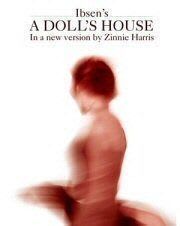The Donmar has put together a stellar cast for this updating of Ibsen's pre-feminist classic, led by Gillian Anderson as Nora Vaughan, an English rose married to a newly-appointed cabinet minister.
Scottish playwright Zinnie Harris makes the most of her opportunities to draw parallels with the current scandal of parliamentary expense claims, the line "as politicians, our staple is trust" evoking roars of laughter.
However, this production suffers from similar problems to Mrs. Affleck, Samuel Adamson's re-writing of Ibsen's Little Eyolf at the National earlier in the year.
It has the Hollywood makeover feel with coherence lacking on a number of fronts as the writer attempts to gain contemporary significance. In particular, the language is determinedly modern, while the costumes and setting are from London exactly a century ago, twenty years after the original production.
Nora spends much of the evening playing the kind of airhead that Dickens loved to idolise, before unexpectedly becoming a tigress in a final encounter with her faintly absurd husband Thomas, played by Toby Stephens, who cares far more for his career than his pretty trophy wife. He is not the kind of man that could ever have been a successful politician, lacking the moral fibre and mental strength to get anywhere near the top of Disraeli's "greasy pole".
The couple's nemesis is former Doctor Who Christopher Eccleston, playing Neil Kelman. This rough Lancastrian is supposed to be a senior MP who has just lost his job to Thomas after the revelation of an unstated financial scandal. However, his demeanour would make him an unlikely political bigwig in any era, let alone the late Victorian period.
The characters who come out best from the modernisation are those that change least. They are a pairing who develop an immediate hatred for each other. Tara Fitzgerald is Christine, Nora's old school friend now fallen on hard times. She is her friend's antithesis, unsmiling but efficient and with a real underlying toughness. It comes as a shock when Miss Fitzgerald smiles at the curtain call, so grim had she been throughout the 2¼ hours up to that point.
That committed socialist irritates Anton Lesser's Dr. Rank, a good man with an unhealthy devotion to Nora and an illness that is terminal. He tries so valiantly to save the day, as Nora's one good act threatens to finish her husband's career, that the viewer cannot fail to be charmed.
This all sounds harshly critical of an evening that, had Ibsen not written a masterpiece along similar lines would seem like great fun, though imperfectly thought through.
Under the direction of Kfir Yefet, Miss Anderson only gets into top gear in an explosive final scene, while Christopher Eccleston is also at his best when storming around. The most impressive performance comes from the actress whose character best bridges the divide between the Harris and Ibsen versions, Tara Fitzgerald.
This version of A Doll's House will probably be remembered as a brave attempt to give the play a sparkling 21st Century resonance but feels like it needed rather longer in development to achieve that goal.
